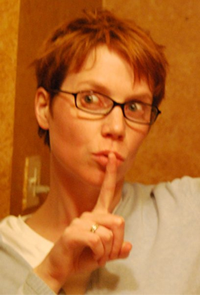Oct
15

Posted by Patricia Devine on October 15th, 2015
Posted in: News from Network Members
 Meg Brunner, our next NN/LM PNR Network member librarian profile, is the Web Information Specialist at the University of Washington Alcohol and Drug Abuse Institute.
Meg Brunner, our next NN/LM PNR Network member librarian profile, is the Web Information Specialist at the University of Washington Alcohol and Drug Abuse Institute.
1. What is your library’s mission and who do your serve? The University of Washington’s Alcohol & Drug Abuse Institute Library (http://lib.adai.uw.edu) primarily serves UW faculty, staff, and students, as well as other college-level students and substance abuse professionals in the region. Our library collection covers the spectrum of research and scientific literature on alcohol and other drug use from all relevant disciplines, including medicine, nursing, social work, criminal justice, sociology, and psychology. Our mission is to support and facilitate science-based research and research dissemination in the field of alcohol and drug abuse.
2. Is there a time when you made a difference or someone was grateful for your help you’d like to tell us about? I have so many stories like that, after over 15 years of working here! But I’ll tell you one from my early years at ADAI, because I’ve never forgotten it and it was one of the things that made me know for sure I was in the right job early on. A man in his early 30s had come into the library and I was helping him collect some information for a paper he was writing for school, where he was studying to become a chemical dependency counselor. As we worked together, he confided in me that he was 6 years sober and had served 3 of those years in prison, after being arrested on drug charges in his 20s. He told me that while he was in a prison, a counselor there had saved his life and he wanted to give back. As we were working together, pulling articles and books from the shelves, I also suggested a few websites to him, and he kind of gave me a blank look. I took him over to our computer, and quickly realized he had never used one before. He didn’t know how to use a mouse, he didn’t know what the web was. So, we sat down for about an hour, and I taught him how to open a browser, do an Internet search, save and print, all those little things we take for granted. He was so excited, and it was just the greatest feeling, getting to see someone’s first introduction to the Internet like that. He was amazed! His mind was blown! I had forgotten what that felt like, that wonder, and it was inspiring to experience it again.
About three or so years later, I got an email from him that I still have tucked in a folder somewhere, in which he thanked me for how helpful I had been, how much time I had spent with him, and told me he’d been a practicing chemical dependency provider since graduation and was loving the work, inspired every day to stay sober and help others. He was also thinking about taking a class about HTML so he could help with his organization’s website! Pretty awesome!
3. What was your path to becoming a medical librarian? I was always very into in science, both in high school and in college, and when I first enrolled in library school at the UW, I was interested in becoming a clinical librarian – at that time defined as a librarian who was part of a health care team that included a physician, nurse, and social worker. I did a year-long program in clinical librarianship that involved working with students from the UW medical school, but while I was taking classes, I needed to get a work study job to help pay the bills, and that’s when I came across a job posting from an ADAI researcher looking for a psychology student to help him organize a reprint article collection. I convinced him what he really needed was a library school student (obviously!), and got the job! While working with him, I got to know the other ADAI librarians, and when I graduated with my MLIS in 1998, they offered me a position here. While I didn’t know a lot about substance abuse back then, I’ve since discovered it’s a fascinating field, because it incorporates not just medical science, but also social science too. Multifaceted and challenging – the perfect fit for me!
4. What would you like other NN/LM Network members to know about your job that they might not know? I don’t do a lot of “traditional” library work around here anymore. We hardly get any in-person library patrons these days, few people are interested in checking out our books, and most people are getting their journal articles online. You know how this goes! As a result, I’ve become increasingly involved in web development and online media over the last decade-plus, constantly learning new skills for better and more effectively delivering information to our users the way they want it delivered. This never-ending change and challenge is one of my favorite parts of my job; I love learning about new technologies and new ways to make the Internet do what I want it to do! It seems like every couple of years, my job evolves again, and that’s, hands-down, my favorite thing about it. Librarians rule!
We will continue to highlight our Network members through October and beyond. Please let us know if you would like to be profiled! No special accomplishments are required, we just want to share what you do. Contact Patricia Devine, devine@uw.edu or 206-543-8275.